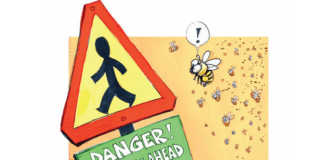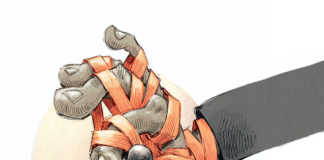A disintegrating Zimbabwe, right in the middle of southern Africa, could result in a massive political, security and social vacuum in the region, with serious implications for all neighbouring states. The situation in Zimbabwe has already started to intrude on South African affairs, though this isn’t yet generally perceived. Yet holding elections won’t necessarily create good governance. It has little to do with a constitution or parliamentary majority, it’s about the population’s quality of life, and their basic needs for housing, transport, safety, education and health services.
The Southern African Development Community (SADC) has given President Thabo Mbeki a mandate to facilitate dialogue between Mugabe and the political opposition. He has to create a tolerant political climate in which free and fair elections can take place. However, since the militarisation of civil society in Zimbabwe, the political opposition has become irrelevant. Under these circumstances, free and fair elections will be extremely difficult to achieve. Yet Mugabe still enjoys a positive political profile in southern Africa.
In desperate need of capital
What Zimbabwe really needs is governing capital. This refers to the expertise and skills government needs if it is to translate legislation into functional output in society. Mugabe has the ability to intimidate his population, but not the ability to govern them. Government institutions are without functional capabilities – hospitals without medicines, schools without education, fuel stations without fuel, a maize board without maize and newly allocated farms without qualified farmers. This isn’t caused by a lack of elections – it signifies an internal collapse of the government itself.
Zimbabwe has also lost its human capital, the quality labour force that provides a country with services such as healthcare, education, security, and so on. In fact, neither the government nor the population in Zimbabwe is likely to survive. No society can survive with an average life expectancy of 30 years. People die before they can contribute to the country. They depend completely on the government and, when the government cannot provide, on handouts from the international community. Over the past 10 years the population has dropped from almost 13 million people to only 8 million; 85% of the population is living in poverty; 80% are unemployed; 90% of the army is infected with HIV and the inflation rate is topping 4 400% (at time of print).
And what about Zimbabwe’s virtual capital? This is the “capital of the mind”, determining the competitive advantage of a country within the global community.
The legacy of land reform
It’s generally accepted that Zimbabwe’s problems started with the process of land reform in 2000. Successful in terms of political numbers, the policy caused a major disaster in terms of virtual capital. The policy failed because it didn’t consider the need to transfer farming capabilities – thus, Zimbabwe destroyed its own resources of expertise and skills.
Today the survival of the population has largely become the responsibility of the international community. Zimbabwe – and most countries in the region – are supported by foreign aid agencies, NGOs, churches and medical groups. This implies that foreign interest groups co-govern the country – something that is not only expected to continue, but likely to expand as governing capabilities decline even further.
It’s unrealistic to expect the population to contribute meaningfully to food security, as the meltdown in human capital is expected to continue. Instead of individual farmers, large corporations will take over. The individual farmer just won’t have the governing capital to participate in the markets. In short, the survival of land reform could be much briefer than politicians in Harare generally expected.
Mbeki’s intervention aims at a political settlement between the government and the opposition. He has been pursuing the same approach that led to the settlement in South Africa. But while Mbeki inherited a working system with governing, human and virtual capital intact, Zimbabwe has none.
Meanwhile, the uncontrolled influx of Zimbabwe’s refugees is already affecting South Africa. Current focus is on job losses to illegal immigrants and potential crime, but we don’t yet understand the full impact of HIV/AIDS on our society, or the potential consequences of a breakdown in animal disease control.













